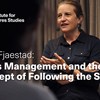complicate
Robert Goodin: Structures of Complicity
Structures of Complicity: Consumers, Producers, Suppliers with Professor Robert E. Goodin, Australian National University AbstractUnder certain circumstances, businesses and consumers might be morally
Dark side of resilience: systemic unsustainability
Frontiers in Sustainability vol 4 Abstract Resilience is often presented as a championing solution for tackling the multi-level environmental, security, health, and financial threats facing the whole hum
Learning by Imitation in Games: Theory, Field and Lab
Erik Mohlin, Oxford University We exploit a unique opportunity to study how a large population of players in the field learn to play a novel game which has a complicated and non-intuitive mixed strateg
Putting the person in to the particle
Report on seminar 'Modelling Social Mechanisms for Knowledge Generation & Exploration' by Nanda Wijermans (Stockholm Resilience Centre) Over the last decade physicists have developed “social force”
Non Ideal Social Ontology III
By 'non-ideal social ontology', we have in mind social ontology that starts with difficult, complicated cases of immediate importance to social theory, rather than starting from simplified or abstractOur thinking is that just as critical philosophers of race such as Charles Mills have made a case for the importance of non-ideal political philosophy, non-ideal social ontology could play an important role in advancing emancipatory social theory. 09.00 Welcome 09.15–10.30 Robin Zheng (Yale-NUS College) “Responding to Bias: Oughts, Ideals, and Appraisals” 11.00–12.15 Åsa Burman (Stockholm University & Institute for Futures Studies) ”Collective responsibility for implicit bias” 12.15–13.30 Lunch 13.30–14.45 Katharina Berndt Rasmussen (Institute for Futures Studies) ”Implicit bias and discrimination” 15.15–16.30 Alex Madva (California State Polytechnic University), ”Responsibility for Interpreting Implicit Bias” 19.00 Workshop dinner 09.00–10.15 Rebecca Mason (University of San Francisco) ”Oppression and Incredulity” 10.30–11.45 Johan Brännmark (Malmö University) ”Institutions, Ideology, and Non-Ideal Social Ontology” 11.45–13.15 Lunch 13.15–14.30 Staffan Carlshamre (Stockholm University) ”Natural kinds, social kinds, mixed kinds” 14.45–16.00 Katharine Jenkins (University of Nottingham) ”Sex and gender, grounding and anchoring” Organized by Åsa Burman & Katharina Berndt Rasmussen. Sponsored by Jane and Dan Olsson Foundation, Institute for Futures Studies, and the Department of Philosophy, Stockholm University Questions? Please contact:
Therese Lindahl: Swedish policy for global climate: what is it and how can we get there?
ONLINE SEMINAR Therese Lindahl, Programme Director, PhD, Beijer Institute of Ecological Economics. Abstract This presentation will first summarize the main findings of the SNS Economic Policy Council Rep

Maja Fjaestad: Crises management and the concept of “following science”
Maja Fjaestad was state secretary for health in Sweden during the Covid 19 pandemic. Recently she published the book (with Emma Lennartsson) “Mitt i krisen” (In the Midst of the Crisis) (Volante, 2024
Completed: The worst lie is the documentary – what role does the subjective documentary film play in a post-truth era?
How can artistic narration, based on subjective perspectives, develop the documentary film? The project will spread knowledge and reach new arenas where artistic research is usually not portrayed.
A Duty to Resist: When Disobedience Should be Uncivil
Mind Abstract Candice Delmas’ A Duty to Resist arrives, fittingly, in a world of increasing authoritarianism, and the caged children and burning forests left in its wake. Widely diagnosed as a failure t

Research seminar with Maja Fjaestad: Post-pandemic reflections on leadership and preparedness: Crises management and the concept of “following science”
Venue: Institutet för framtidsstudier, Holländargatan 13, 4th floor, Stockholm, or online.Research seminar with Maja Fjaestad, IFFS researcher, expert coordinator at the Center for Health Crises at KI








